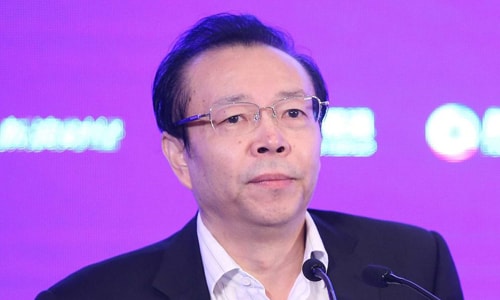Corrupt Chinese Official Has More Than 100 Mistresses, Stores 3 Tons of Cash
The former chairman of China's largest financial company was accused of many crimes such as exchanging money for sex and buying and selling official positions.
 |
Former chairman of China's largest financial company Lai Xiaomin. Photo: BJN
On October 15, the CCDI announced the results of its investigation into Lai Xiaomin and used unprecedentedly harsh words to accuse Lai, such as "arrogant dictatorship, depravity, moral degradation, and extravagance."
He was expelled from the party, dismissed from office, had his corruption case transferred to the prosecutor's office, and his assets confiscated due to "serious corruption, causing negative political influence".
Lai Xiaomin, 56, was announced to be under investigation by the Central Commission for Discipline Inspection (CCDI) of China on April 17. The investigation into Lai Xiaomin is considered "the biggest financial corruption case since the founding of China," according to China Finance Magazine.Caixin.
Lai Xiaomin has many years of experience in the financial industry, holding many senior management positions for more than 10 years at the People's Bank of China before being appointed deputy party secretary and CEO of Huarong State Asset Management Company in 2009 and promoted to secretary and chairman in 2012.
An acquaintance assessed that Lai Xiaomin has "incredibly big guts" and "an extremely good memory, remembering every single thing he did without fail." Revealing to Caixin, this person said, "Lai Xiaomin is like the 'emperor' of Huarong, holding absolute power, with no balance of power, so Lai is so bold that it exceeds the imagination of ordinary people."
Lai Xiaomin owns 120 apartments and has more than 100 mistresses, including several famous actresses in the Chinese entertainment industry as well as employees of Huarong. Many of Lai's mistresses hold managerial positions in Huarong's subsidiaries. Lai Xiaomin has an unwritten rule with his mistresses: the longer the relationship, the higher the position the mistress is assigned. Lai has divided 100 apartments among his ex-wife and mistresses.
According to people close to Lai, he has a special fondness for cash. Authorities discovered three tonnes of cash worth 270 million yuan ($39 million) in Lai's properties in Beijing, including many foreign currencies.
Employees at Huarong said that during Lai's five years in power, the hidden price to get a job at Huarong or its subsidiaries was 300,000 yuan ($43,400) for a regular position, more than $72,000 for a management position, and more than $144,000 for a subsidiary director position.
During his time in Huarong, he also built the so-called “Jiangxi clique” – a group of people whom Lai Xiaomin carefully recruited from his hometown in Jiangxi province, southern China. To enhance his political position, he also appointed many positions to the children and relatives of high-ranking government officials.
After China stepped up its anti-corruption drive a few years ago, Lai began to find ways to hide his cash-stash apartments. One of Lai’s apartments was bought and sold five times before being put under his name. People who wanted to do business with Hua Rong and Lai would transfer money to his mother’s account, rather than giving it directly to Lai. Lai’s mother’s bank account had 300 million yuan ($43.4 million).
Huarong was one of four asset management companies set up by the Chinese government in 1999 in response to the 1997 Asian financial crisis. Under Lai, the company expanded into other financial sectors, including securities, financial leasing and real estate, becoming China's largest financial asset management holding group. Since 2015, the company has invested more than $433 million overseas.

